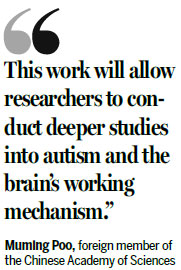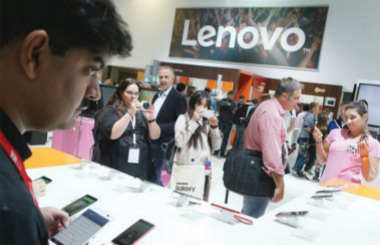Monkeys get autism gene in quest for treatments
Updated: 2016-01-26 08:08
By Wang Hongyi in Shanghai(China Daily)
|
|||||||||||
Research shows that nonhuman primates can be used to study human brain disorders
Chinese researchers have successfully created autistic monkeys by implanting autism-related genes into monkey embryos.
The monkeys are the world's first nonhuman primates to show the effects of autism and will play an important role in studying the pathology of the condition and exploring effective intervention and treatment.
The research has demonstrated the feasibility of studying brain disorders with genetically engineered primates, according to neuroscientist Muming Poo, a foreign member of the Chinese Academy of Sciences who is also a member of the National Academy of Sciences in the United States.
"For quite a long time, there has been little good drug innovation in autism due to the lack of suitable animal models. This work will allow researchers to conduct deeper studies into autism and the brain's working mechanism," Poo said.

Patients with autism spectrum disorder, one of a range of neurodevelopment problems, usually exhibit defects in social interaction, stereotyped repetitive behaviors, anxiety and emotional difficulties.
In recent years, the incidence of autism has continued to rise globally, and there is no effective treatment. According to a national epidemiological investigation into the prevalence of autism spectrum disorder, about four in every 1,000 Chinese children between age 6 and 12 have the condition.
"In this regard, the creation of an autism animal model to carry out related studies has been a major goal in both medicine and neuroscience," said Qiu Zilong, researcher at the Institute of Neuroscience at the Shanghai Institutes for Biological Sciences under the Chinese Academy of Sciences.
Qiu Zilong's lab, working with the team of another researcher, Sun Qiang, used transgenic methods to alter the genetic code of the monkey by implanting a synthetic human autism-related gene, MECP2.
In the future, the researchers will try to find out which defects in the neural circuits led to social interaction disorders and repetitive behaviors, as well as how the autism gene influences brain growth and function, Qiu said.
This research was to be published online in Nature on Tuesday.
Today's Top News
China's growth envy of developed world
Foreigners find hard to but China's rail tickets
Rags to riches saga underlines China's transformation
Leaders address Iran's thirst for growth
UK's interest in China boosted by BBC TV series
Global push
AIIB chief vows to run clean, lean, green institution
'More Europe' to deal with 'triple crisis'
Hot Topics
Lunar probe , China growth forecasts, Emission rules get tougher, China seen through 'colored lens', International board,
Editor's Picks

|

|

|

|

|

|






